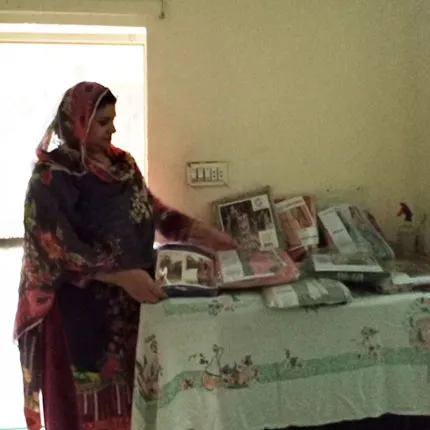
Saadia runs her own online clothing business, employing four other local women. She started the company as a stitching center five years ago, and has gradually moved the business online.
Becoming a businesswoman in Pakistan is not straightforward, particularly considering only 7% of Pakistani women have access to formal financial services. When taking out a loan, women usually need a male guarantor and have to provide post-dated cheques. Women also face other cultural restrictions, including travel limitations, often preventing them from meeting with male suppliers or customers.
When she first started, Saadia knew that she needed some investment to grow the company. She heard about a microfinance bank, who gave her a start-up loan. “Once I got the loan, more women from my area got involved in the business and it started to slowly grow,” Saadia says.
Going into business has had an incredibly positive impact. “My business has given me so much confidence. I feel stronger, and it has helped me overcome my financial problems. I now have the strength to go out and succeed,” she adds.
The impact of her business has not been a singular success story. Saadia has recruited other women from her neighborhood into the business. “All of the women who work with me are very happy and satisfied with the work,” Saadia says. “By earning, we have solved a lot of our household problems. Our children are also involved with us in the business. We are supporting our families and they support us too. I get such positive vibes from bringing along other women with me.”
Saadia’s move to an online business has been critical to her company’s survival during the COVID-19 pandemic. “Business slowed down, but it kept running,” she says. “We benefitted a lot from our online mechanism. We remained linked to our customers and continued to deliver clothes.”
“During the lockdown, we benefited a lot from being online.”
The online company has experienced a few problems along the way, particularly when Saadia’s Facebook page was hacked. “Somebody used my name fraudulently, resulting in a business loss,” she recalls. Saadia registered a complaint with Facebook and received support to recover the lost income. She has now switched to predominantly running the business via WhatsApp, where she deals more directly with her customers.
Saadia is now looking at diversifying her services, adding “with clothes you can expand into salon services for women and there are different businesses which you can start and progress.” But in order to grow and diversify the company, she needs more investment.
Through CARE’s Ignite program, supported by the Mastercard Center for Inclusive Growth, Saadia and many other Pakistani entrepreneurs like her, will have new opportunities to grow and diversify her company. By partnering with local service providers, CARE Pakistan will be able to open up access to capital for entrepreneurs, as well as access to skills development, including building on those much-needed digital skills.
Saadia aims to match these new opportunities with her own business ambitions, concluding, “I want to grow my business and sell internationally. I want to introduce my products to other countries.”
